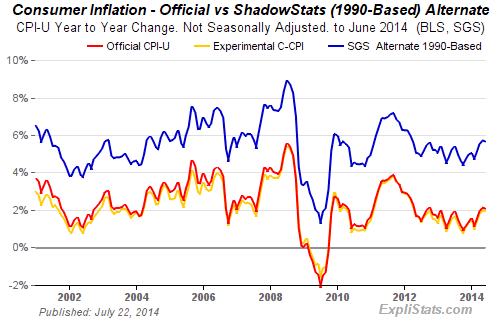Why won't inflation conspiracy theories just die already?
Personal experience may tell us that inflation is rising. But it is not the whole story — not by a long shot.

A free daily email with the biggest news stories of the day – and the best features from TheWeek.com
You are now subscribed
Your newsletter sign-up was successful
It's the economic conspiracy theory that simply won't go away: that inflation is really much higher than the government says it is.
It's been propagated by a long list of right-wing talking heads, including former Alaska Gov. Sarah Palin, Harvard history professor Niall Ferguson, National Reviews's Amity Shlaes, and former presidential candidate Ron Paul.
As I argued in 2013, it isn't the government that is rigging the data, but the conspiracy theorists. Shadowstats, the most egregious data manipulator, takes the government numbers and adds an arbitrary constant to make it look like inflation is much higher:
The Week
Escape your echo chamber. Get the facts behind the news, plus analysis from multiple perspectives.

Sign up for The Week's Free Newsletters
From our morning news briefing to a weekly Good News Newsletter, get the best of The Week delivered directly to your inbox.
From our morning news briefing to a weekly Good News Newsletter, get the best of The Week delivered directly to your inbox.

(Shadowstats)
The underlying rationale of Shadowstats' argument is personal experience. "Have you ever wondered why the CPI, GDP, and employment numbers run counter to your personal and business experiences?" the site asks.
Shadowstats points to the fact that the methodology for calculating inflation changed slightly in the 1980s and 1990s, arguing that was the point at which the government methodology ceased to reflect reality.
The truth is the opposite, though. Economics is an evolving field of science; as economists learn more about how human beings and markets behave, statistical methodology is updated to reflect this.
A free daily email with the biggest news stories of the day – and the best features from TheWeek.com
So it's no surprise that private estimates of inflation, such as MIT's Billion Prices Project, that actually calculate price changes based on real, independent data confirm that the government figures are roughly correct.
The real question is why these conspiracy theories continue going strong even after they've been debunked multiple times.
Paul Krugman attributes the phenomenon to creditors and rentiers who would benefit from and want to see higher interest rates. They want the Federal Reserve to stop fighting unemployment and to raise interest rates, which would increase income from their investments. So they are hankering for data that will confirm the notion that the Fed's monetary stimulus of recent years has been excessively inflationary — even if that means using questionable data.
There is a lot of truth to Krugman's explanation. Those who argue that inflation is higher than the official numbers have often made predictions that the Fed's monetary stimulus will cause inflation to soar. That includes Shadowstats' John Williams, who predicted an imminent "hyperinflationary depression" in 2009.
But the trouble with inflation is that it is hard to measure, because personal experience of it can massively deviate from the real level.
Changes in prices are different for everyone, because everyone purchases different goods and services, whereas the official inflation numbers are an average of all the different sectors of the economy.
Some sectors deviate wildly from the average: for tuition, school fees, and childcare, inflation right now is 23 percent. For meat, fish, poultry, and eggs it's 7.5 percent. Meanwhile, for personal computers and peripherals, the rate is in heavy deflation at -6 percent. For new and used motor vehicles, it's flat at zero.
So for the person or firm spending a lot of money on computing equipment, prices are currently falling. The opposite is true for those spending a lot on tuition fees. And that's barely scratching the surface — have a look at all the different sectors, and you'll see that different people can all experience radically different rates of inflation depending on what they buy, even while inflation as a whole is low and stable.
Of course, this underlines the importance of the broader picture, especially for a central bank responsible for monetary policy which affects the entire economy.
But it's difficult for individuals to discard their personal experiences. And that is the trap that Shadowstats and its followers have fallen into.
John Aziz is the economics and business correspondent at TheWeek.com. He is also an associate editor at Pieria.co.uk. Previously his work has appeared on Business Insider, Zero Hedge, and Noahpinion.
-
 How the FCC’s ‘equal time’ rule works
How the FCC’s ‘equal time’ rule worksIn the Spotlight The law is at the heart of the Colbert-CBS conflict
-
 What is the endgame in the DHS shutdown?
What is the endgame in the DHS shutdown?Today’s Big Question Democrats want to rein in ICE’s immigration crackdown
-
 ‘Poor time management isn’t just an inconvenience’
‘Poor time management isn’t just an inconvenience’Instant Opinion Opinion, comment and editorials of the day